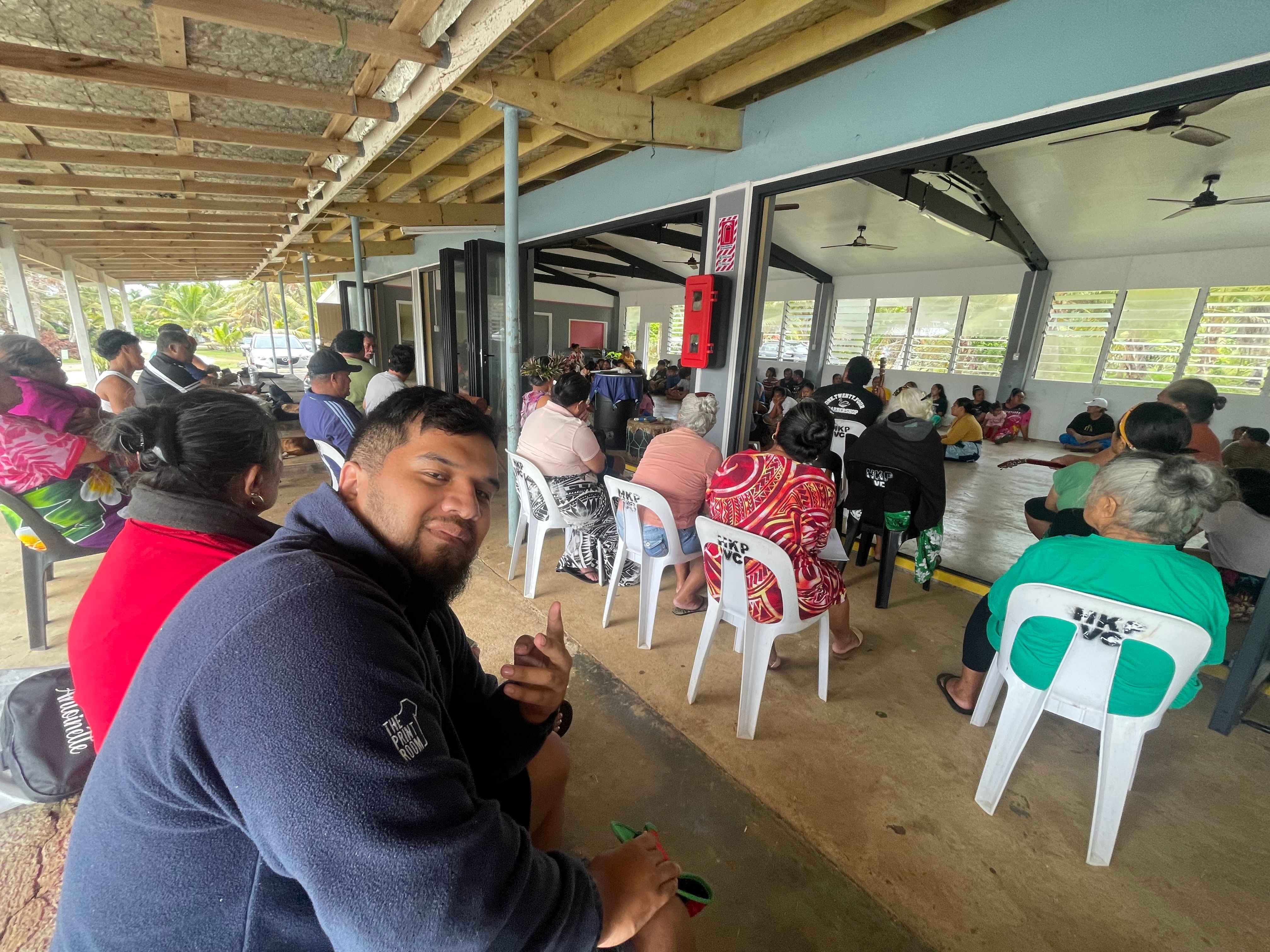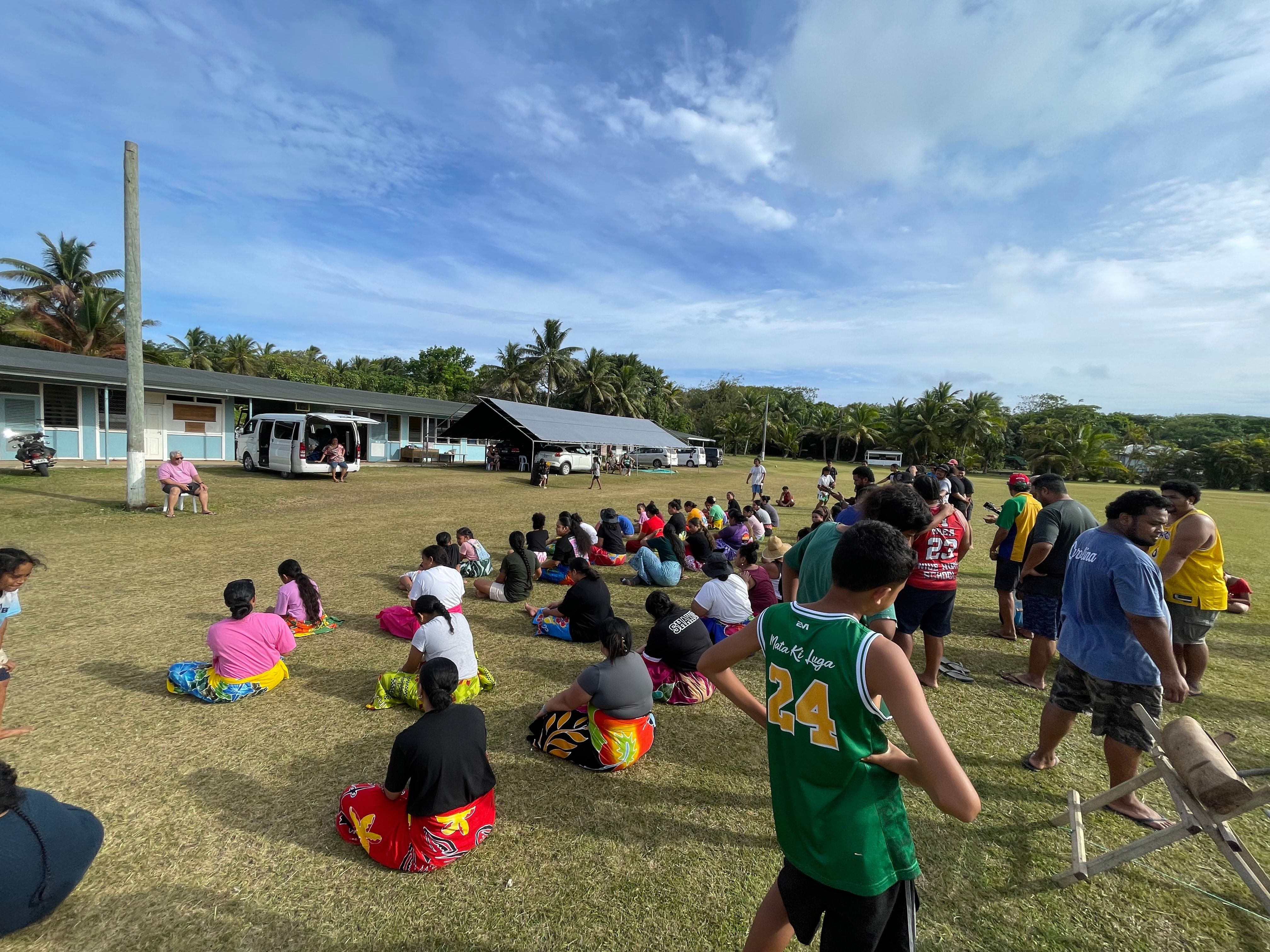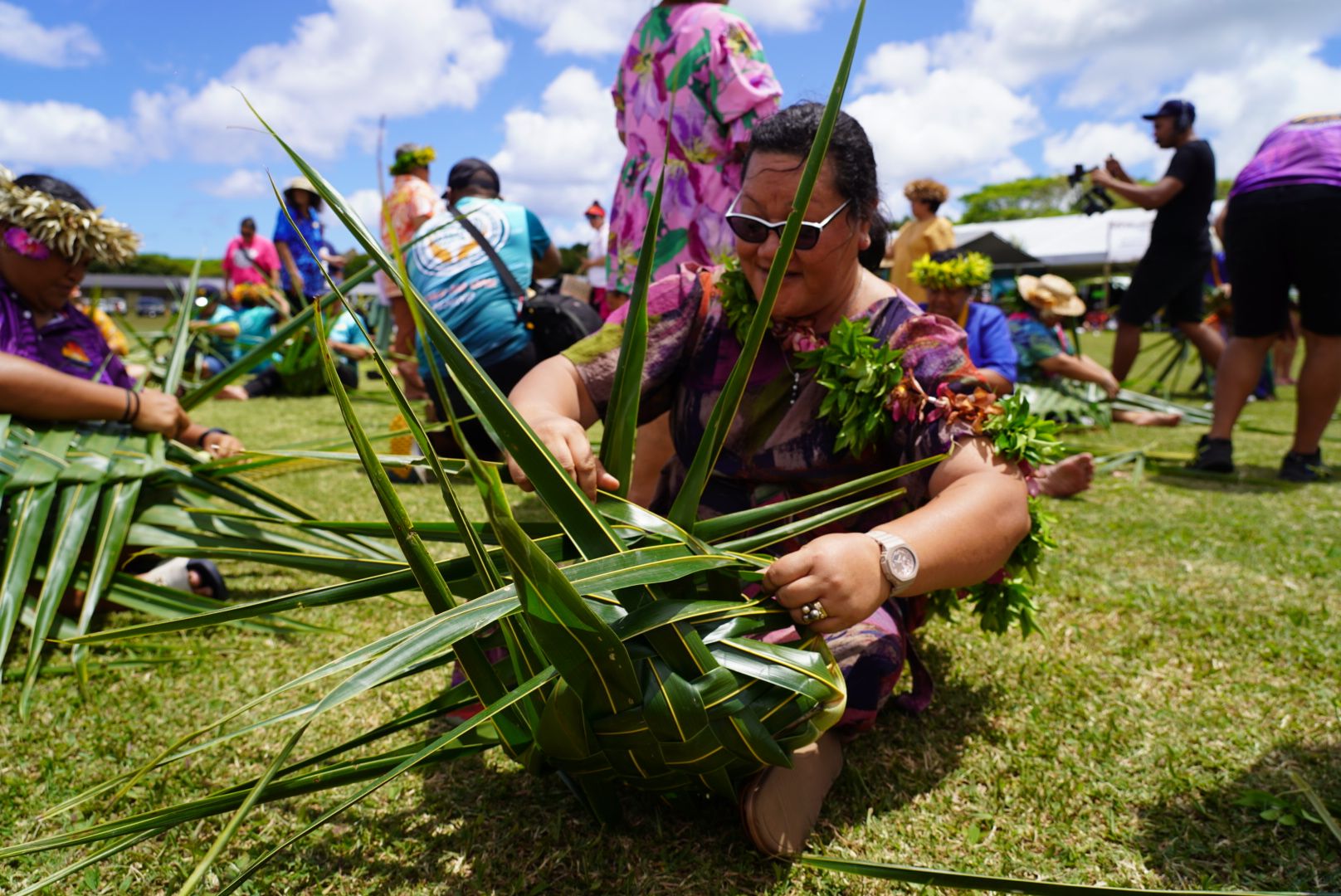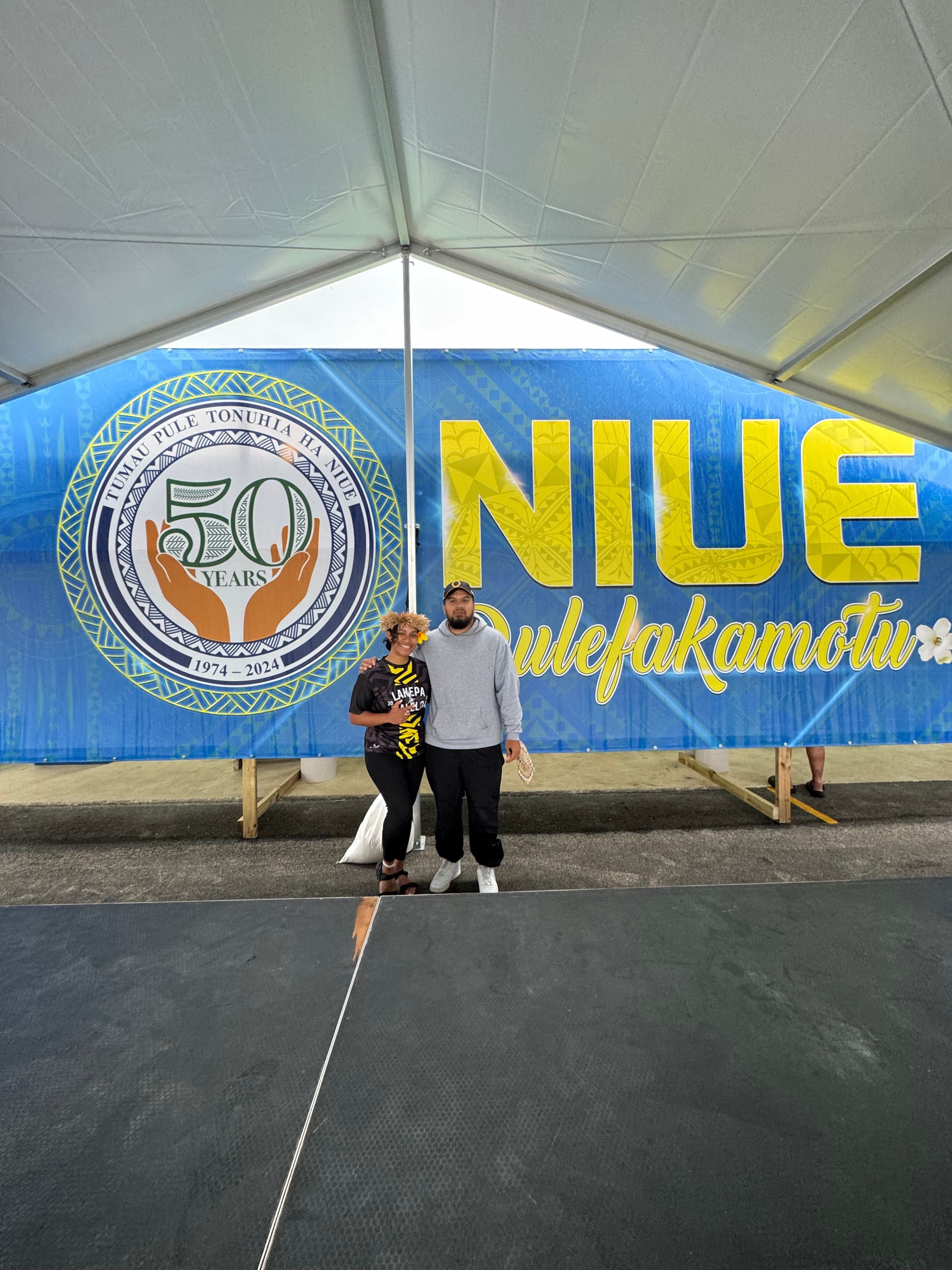

Meeting Niue's Prime Minister Dalton Tagelagi for the first time.
PMN News/Sariah Magaoa.
'I don’t know Niue, but Niue knows me'
PMN News Multimedia Journalist Matt Manukuo reflects on heading home to Niue reporting on country’s 50th Pulefakamotu celebrations.



Moana Pasifika end Lautoka curse to win 'Battle of the Pacific'


A.R.T sets new Pacific music pace with ‘First Thursday’ releases



Moana Pasifika end Lautoka curse to win 'Battle of the Pacific'


A.R.T sets new Pacific music pace with ‘First Thursday’ releases
For two weeks I was asked: “Ko hai e higoa haau? Ko hai e tau matua?”
I would reply: “Ko au ko Matt Manukuo, Ko tama Luka Manukuo au”
Even though I had been absent from Niue for five years and didn’t recognise many faces, the people of Niue knew me. They knew my parents, my grandparents and my family.
I was in Niue to report on the lead-up to Niue’s 50th Pulefakamotu Celebration, the biggest day in Niue’s history. Fifty years ago on the 19th October 1974, Niue became a self-governing nation in free association with New Zealand.

Watching the Hakupu Young Peoples Fellowship practice.
And reflecting on the past 50 years of Niue’s relationship with New Zealand, I thought about the significance of being back home in Niue, as a product of my grandparents’ wishes.
They left Niue in search of a better life in New Zealand. And over six decades later, I’d returned to their home.
Being part of the Niue Diaspora
My family has lived in New Zealand for the last 60 years, and now for me and my siblings, Aotearoa has become home.
It’s also a home to over 30,000 Niueans living in the country. But this has left Niue severely underpopulated, with around 1600 people living on the island.

Youth members of the Ofaga ha Keriso Youth Group of Wellington, who like me, are part of Niue's diaspora. Photo/PMN News/Matt Manukuo.
For the past 50 years, Niue’s relationship with New Zealand has provided several benefits for the Niue people. Niueans carry a New Zealand passport, use New Zealand currency and have access to benefits as New Zealand citizens.
But this has also made it easier for our people to leave the island. On my trip to Niue, I quickly learned the impacts of having so few people on the island.
Houses were abandoned, people worked multiple jobs, wages were low, and in recent years many have left the island, not to return.
I learned what the festive seasons are for our people, providing food for village events, dance practices, giving monetary donations to church, festivals and families.
Each event I attended or each family member I saw, they provided me food that might have taken months for them to prepare.
As someone from New Zealand, seeing the ways of the people living back home, it was hard to wrap my head around. Our people, though underpopulated, still wear a smile in every setting and wave at every car on the road.
I have a greater respect for the people on the island who have been keeping our traditions alive.
I reflect on comments made a few weeks prior at the PINA conference in Niue from Lakepa MP Rhonda Tiakia about living in Niue: “Ko tau toa ni ne nonofo i Niue - Only Warriors live in Niue”.

Members of the Hakupu Young Peoples Fellowship at Tuatea, Hakupu practicing before their big performance at the 50th Pulefakamotu. Photo/PMN News/Matt Manukuo.
And now I have a better understanding of that idea, living on Niue can be a challenge.
The responsibility to uphold our Niue agafakamotu (Niue culture) that has spanned hundreds of years, working multiple jobs and keeping our island alive while thousands of us live abroad requires a certain level of “warrior-ness”.
Niue Pulefakamotu
Prior to this trip, I didn’t realise the magnitude of Niue’s Constitution Day on the island and how important it was to our people. I thought of my grandparents and parents always attending the service in Māngere on Constitution Day, but never quite knew what it meant.
One night on our trip, someone raised a drink to me and said “Happy 50 years, bro”.
As one of thousands who are living abroad, a Niue native embraced me as a fellow countryman in this monumental celebration for our country.
Constitution Week is the week leading up to Niue’s Pulefakamotu every year on the 19th of October. This year, celebrations tripled in magnitude.

This was taken at the National Showday, an event I'd never been to. The weaving is a competition that's held every year at the National Showday. Photo/PMN News/Sariah Magaoa.
Events were littered around the island, and we made sure to attend all of them.
One of my favourites was the National Showday, which is a celebration that invites all of Niue to celebrate, share food, crafts and performances.
On my last night in Niue, I went to dinner with the MP for Hakupu, Ritchie Mautama and his family at the Vaiolama Cafe. Also in attendance were the “1974 Babies”, who were all born in Niue in that historic year.
My mother is one of those special babies born in 1974 on Niue island, and when she was a baby, her mother brought her over to New Zealand.
And 50 years later, it was so special, as her son, to be stepping back on the island during a year that holds such historical significance to my people.
A collaboration with Niue
Niue’s relationship with New Zealand has spanned longer than the 50 years of this constitutional agreement.
And for us living in Aotearoa and abroad, we always hear the calls of Niue calling us home.
This trip, and this historic celebration for Niue has intensified those calls for me to return. Reflecting on the trip, I was joined by PMN News Multimedia Journalist Sariah Magaoa, another fellow Niuean, who was born and bred on the island.

Sariah Magaoa and at the Hannan International Airport before heading to New Zealand.
I learned how contrasting our worldviews are, as Niue-born and NZ-born Niueans. We’re both the same age, but our experiences of being a Niue are vastly different.
This trip was an eye-opener for both of us. For Sariah, it was an opportunity to teach the NZ-born Niuean the beauty of our culture, vagahau, and of the Pulefakamotu.
For myself, it was teaching Sariah that not a lot of us in New Zealand have strong connections to our Niue culture and language. But opportunities to return home are so important for us to reconnect to those values.
The collaboration between Sariah and myself is something I think Niue people should strive for in future. These experiences of Niueans living abroad and living on the island can be mutually beneficial in furthering our small island nation.
And hopefully 50 years from now, our people from New Zealand and abroad can return home, collaborate and help move our country forward.
That’s what this trip has taught me, 50 years strong for Niue. And I hope the next 50 will be even stronger.
Monuina e 50 tau Pulefakamotu!